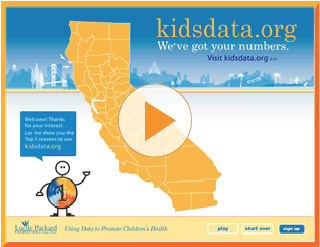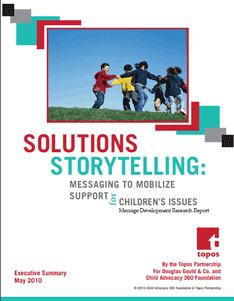Using Kidsdata.org to Advocate for Your School District
Are you a PTA member? Work for an education foundation? Advocate for education improvements?
If so, kidsdata.org can help you. The site offers wide-ranging data about students statewide – at the county and school district levels. You can use these data to monitor trends, assess needs, educate your constituents, and advocate for improvements.
Examples of Data Available for School Districts Across California:
(Click “see related data” on the pages below to see all available indicators for that topic)
- Student Reports of Bullying & Harassment | Gang Involvement and Perceptions of School Safety — among the indicators that are available from the California Healthy Kids Survey (CHKS).
- Special Education Enrollment
- Math Proficiency | Reading Proficiency
- Enrollment in the Free/Reduced Price Meal Program
- Weight Scores | Fitness Scores
Data can be viewed as maps and tables or bar, trend, and pie graphs, and many measures can be customized by locale, year, ethnicity, grade, and more. You even can obtain summaries of data for every school district in California — and customize those summaries to suit your needs.
Posted by kidsdata.org
Tags: News About Kidsdata.org
The Great Divide Between Parents’ Worst Nightmares and What Really Happens to Kids
 Bad things happen, and for parents, every news flash and tragic headline can make them fear the worst about their child’s safety. What is the greatest fear you have for your child? Terrorists? Dangerous strangers? According to a recent article on NPR, these are among the more common fears that parents have. But they’re extremely detached from reality, experts say, and many parents may not be paying enough attention to everyday risks, instead focusing on and fearing these unlikely scenarios.
Bad things happen, and for parents, every news flash and tragic headline can make them fear the worst about their child’s safety. What is the greatest fear you have for your child? Terrorists? Dangerous strangers? According to a recent article on NPR, these are among the more common fears that parents have. But they’re extremely detached from reality, experts say, and many parents may not be paying enough attention to everyday risks, instead focusing on and fearing these unlikely scenarios.
Topping the list of parents’ greatest fears are kidnapping, school snipers, and terrorists, when in reality, the most common cause of death or harm to children is car accidents. This misplaced focus on the extremely unlikely is detrimental to kids because it distracts parents from the dangers that matter, says Christie Barnes, author and mother of four, whose work was featured in the NPR article. By focusing their energies instead on the simple, everyday safeguards to a child’s health – such as buckling them up in the car or teaching them proper pool safety – parents can take charge of their child’s well being.
Here are the top five ways kids are hurt or killed in this country, accompanied by related data for kids in California:
1. Car accidents. Unintentional injuries, including accidents, were the leading cause of death in ’07 among CA kids of all ages
2. Homicide. Accounted for 39 deaths of CA kids ages 5-14 in ’07 – and 388 among California kids ages 15-19
3. Abuse. In California, there were 97,220 substantiated cases of child abuse in ’08
4. Suicide. 383 children/youth ages 5-24 committed suicide in ’07
5. Drowning. There were over 25,000 hospitalizations due to unintentional injuries, including drownings, in CA among kids under age 20 in ’06
Posted by Jordan Handcox
Post Comment
School Support Personnel: Gains Mask Needs
What to make of the fact that here in California, we have higher numbers of school support staff (counselors, psychologists, nurses, librarians, social workers, resource specialists, and speech/language/hearing specialists) than a decade ago?
If we were placing bets, most of us probably would guess that over the last decade, schools’ ability to offer resources beyond the classroom would have diminished, perhaps even greatly.
But we’ve made gains – no doubt about that. California students’ access to support staff improved from a ratio of 340 students to 1 pupil support personnel in ’98 to 211:1 in ’09.
Despite that progress we still have a long way to go – and that may be the key take-away from these data. After all, when measured up against national recommendations, we’re not doing well in California. For example, while the students-to-counselor ratio improved markedly from ’98 to ’09, the actual ratio – 668:1 in 2009 – is much worse than the American Counseling Association’s recommendation of 250 to 1. Likewise, there are more nurse FTEs in our schools – about 25% more in ’09 than ‘98. However, California’s 2009 ratio of nurses per student – 2,035:1 – is nearly three times worse than the Centers for Disease Control and Prevention recommendation of 750 students per nurse.
And keep in mind, too, that the pupil support indicators on kidsdata, while quite recent, may not yet take into account the ramifications from the Great Recession. In the graph above, it’s hard to miss the fact that the growth in pupil support FTEs stalled in 2009. We’ll check back next year to see what 2010 data tell us.
Student support staff provide a crucial range of services. Counselors offer prevention programs; speech/language/hearing and resource specialists work with children who have special needs; and nurses serve as a link to health resources and often provide basic health care and screening.
As the increasing poverty rate due to recent economic woes takes its toll on children, these kinds of in-school services are all the more crucial. Are school budgets so lean now that we’re finding it harder to address students’ overall well being? We can see what’s happening statewide – gains followed by a possible retrenchment – but we want to hear your local insights. Please add a comment below or on kidsdata’s Facebook page.
Posted by Andy Krackov
1 Comment
News Round-Up Features Articles About Autism, Whooping Cough, Special Needs, and More
The September issue of the Kidsdata News Round-Up now is available — read it here.
A few highlights:
Autism
Mother of Autistic Child Shares Back to School Stories and Struggles
(SF Chronicle, 8/26/10, by Shumaker and Winegardner)
Immunizations (Whooping Cough)
San Francisco Public Health Department Plans to Order Unvaccinated Kids to Stay Home if Classmates Get Whooping Cough
(Bay Citizen, 8/17/10, by Mieszkowski)
Vaccination Rates Remain Steady, but Cases of Whooping Cough Are Surging Nationwide
(NY Times, 8/16/10, by Parker-Pope)
Special Health Care Needs
Schwarzenegger Announces Launch of Nation’s Largest ‘Telehealth’ System; Will Make Specialty Care More Accessible for Children with Special Needs in Medically Under-Served Areas
(LA Times, 8/18/10, by Hennessy-Fiske)
Young Adults with Special Needs Find it Hard to Part with Their Pediatrician
(WSJ, 8/10/10, by Beck)
Posted by Jordan Handcox
Tags: Child Health Issues
September is National Childhood Cancer Awareness Month
 Having a loved one diagnosed with cancer can turn a family’s life upside down, especially if that loved one is a child. A child’s days are supposed to be spent playing and learning about life’s wonders, not sitting in a hospital awaiting painful chemotherapy treatments.
Having a loved one diagnosed with cancer can turn a family’s life upside down, especially if that loved one is a child. A child’s days are supposed to be spent playing and learning about life’s wonders, not sitting in a hospital awaiting painful chemotherapy treatments.
To help raise awareness, September is recognized as Childhood Cancer Awareness Month; we thought we would mark the occasion by highlighting data on childhood cancer in California.
More than 8,500 children in California were diagnosed with cancer from 2002-2006, the most recent period for which data are available. Moreover, the rate of childhood cancer diagnoses increased 49% from the 1997-2001 period to the 2000-2004 period; it held steady from 2000-04 through 2002-06.
Among California children diagnosed with cancer from 1996 through 2006, an estimated 76% survived for at least five years after their diagnosis. Survival rates vary by type of cancer. The most common form of childhood cancer, by far, is Leukemia.
Caucasian/White children have the highest rate and number of cancer diagnoses of all racial/ethnic groups, but also the highest survival rate.
Share these data with your colleagues, friends, and family members to help raise awareness about childhood cancer.
Posted by kidsdata.org
Post Comment
Effective Advocacy: Turning Data into Stories that Work
At kidsdata.org, we aim to give you the data you need to tell the stories you need to tell, whether those stories are about policies that need to change, programs that need support, or issues that need attention. New research commissioned by Child Advocacy 360 sheds light on the kinds of stories that move people to action on behalf of children and youth.
According to this report, child advocates will be most effective when they tell stories focused on solutions, not just problems. In their efforts to raise awareness about the problems facing many children and youth, advocates may undermine their effectiveness, leaving people with a feeling that “nothing works.” In contrast, effective stories about the many programs and policies that make a difference for children achieve the following:
- Connect to the Community: Help people see how communities can address the problems children face, rather than seeing children only in the context of individual families
- Help People See the Big Picture: Highlight several kinds of solutions to problems, or illuminate the role of public structures in solving the problem
- Reinforce the Need: Stories position the solutions they’re advocating as necessary, not just nice
- Invite and Inspire Action: Offer examples of people who are doing what you want others to do
- Demonstrate Effectiveness: Provide evidence that the proposed solutions work
You can find a video highlighting the report’s key findings, along with the full report and recommendations for advocates, here: http://sparkaction.org/content/telling-right-stories-new-national-research-messaging-child-advoc
How do you weave data into compelling stories? Please share your own examples from grant proposals, public testimony, letters to the editor, etc.
Posted by Sarah Marxer
Post Comment
Tough Economy May Threaten CA Child Care Supply
Imagine losing a trusted, licensed child care provider for your toddler because their home – their place of business – was foreclosed. Then imagine finding a new provider, only to be laid off from your job.
This is a true story highlighted in a press release by the California Child Care Resource & Referral Network. According to their 2009 California Child Care Portfolio, an already tight supply of quality, licensed child care in California is getting even harder to find due to the economic downturn.
Despite a roughly 20 percent increase between 2000 and 2008 of licensed child care facilities and the number of slots within those facilities, licensed child care in California was available for only 27 percent of children ages 0-13 with working parents.
Of course, not all working parents require licensed child care, but the potential demand for child care still far outweighs supply. In a time when foreclosures are high and jobs are hard to find, difficulty finding child care puts additional strain on working families.
Some other highlights from the newly available childcare data on kidsdata.org:
- From 2000 to 2008, the number of licensed child care facilities – and the number of slots within those facilities – increased by about 20 percent statewide. However, due to shortages of qualified staff and other issues, many child care providers do not fill all of their slots; therefore, the number of slots may overestimate the available care.
- In 2008, licensed child care in California was available for 27 percent of children ages 0-13 with working parents. As noted above, not all children with working parents need licensed care; some may be cared for by family members, nannies, or others.
- Almost 10 percent of parents statewide request child care during the evenings or weekends, according to the 2009 California Child Care Portfolio, and only 1-2 percent of licensed centers offer this type of care.
- While family child care homes are more likely to provide care during evenings or weekends, they represent only about a third of the licensed child care slots in the state.
On kidsdata.org, you can find child care data for counties statewide, as well as a “dashboard” of data highlights on child care in California. And please add a comment below to share your insights or experiences regarding child care issues in California.
Posted by kidsdata.org
Post Comment
New Blog Highlights California Health Issues
 Congrats to KQED on the launch of its new blog, Our State of Health, which explores health issues across California. To quote KQED’s outreach coordinator: “The blog was launched with the idea that the best way to learn about the health of our communities is to give voice to community members themselves.”
Congrats to KQED on the launch of its new blog, Our State of Health, which explores health issues across California. To quote KQED’s outreach coordinator: “The blog was launched with the idea that the best way to learn about the health of our communities is to give voice to community members themselves.”
The blog highlights health issues affecting all Californians, including children, and already features posts about asthma and breastfeeding. Check it out at http://blogs.kqed.org/ourstateofhealth/.
Posted by Felicity Simmons
1 Comment
Study: Obesity Rates Fall for Asian American, White Children but Rise for Other Groups
According to a study from the University of California, San Francisco, obesity rates among Caucasian and Asian American children have fallen in recent years. The study also found that child obesity rates have leveled off among Latino children.
What is the reason for this good news? Here’s an excerpt from a recent San Francisco Chronicle article:
“For the first time in more than three decades, obesity rates for white and Asian children are falling in California, and they seem to have leveled off for Hispanic kids – all good signs that public health campaigns aimed at keeping young people away from unhealthful sweets and fatty foods are starting to work, according to a UCSF study.”
But, it’s not all good news. The same study noted that obesity rates among African American and American Indian girls are rising. Researchers say this indicates that public education campaigns need to be more widespread. Also from the article:
“We can attribute the plateaus to increasing awareness of pediatric obesity in families and communities. And there’s been a consistent effort by pediatricians to identify overweight and obese kids,” said Dr. Padmaja Padalkar, an assistant chief of pediatrics who specializes in working with overweight children at Kaiser Permanente San Jose Medical Center. “But this study also reminds us that we’re far from being out of the woods.”
Do you think your community is doing all it can to combat and prevent child obesity?
Here are some links to related measures of child health on kidsdata.org:
Posted by Felicity Simmons
Post Comment
Kidsdata.org’s Statewide Expansion Is Complete!
 Over the last year, kidsdata.org has been phasing in data for all counties, cities, and school districts in the state. This expansion is now complete, and more than 400 measures of child health and well being are available.
Over the last year, kidsdata.org has been phasing in data for all counties, cities, and school districts in the state. This expansion is now complete, and more than 400 measures of child health and well being are available.
Watch this video to learn about kidsdata.org’s helpful features, and find tips to quickly locate the data you need. We’ll also continue to add new topics in the coming months, such as indicators related to environmental health.
Have any questions about kidsdata.org? Post them on our Data Questions page.
Posted by Felicity Simmons
Post Comment



